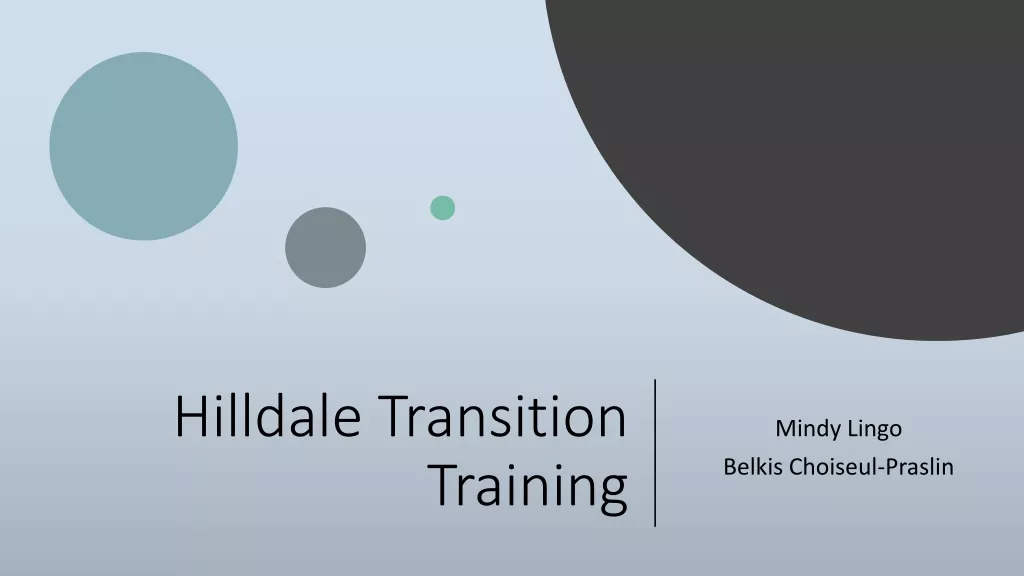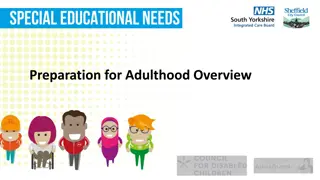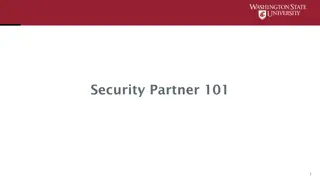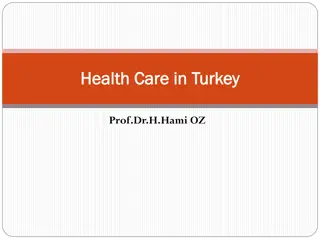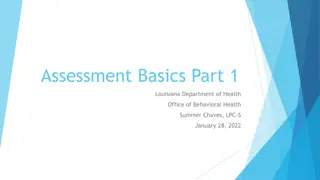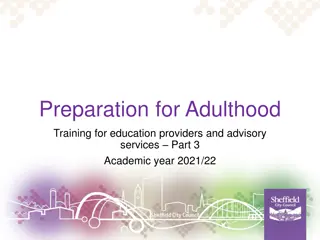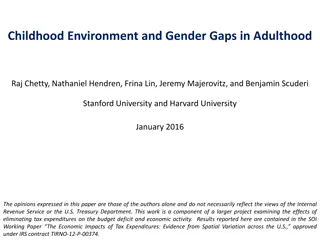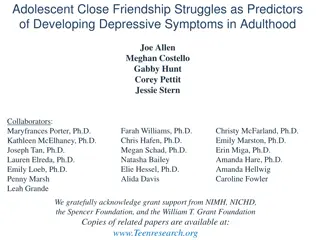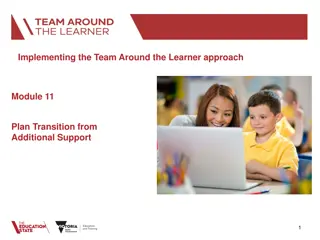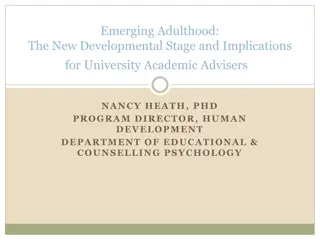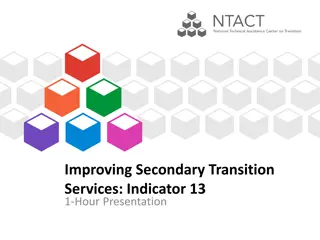Social Security Benefits Transition to Adulthood Family Education Day
This presentation covers an overview of SSI/SSDI, differences between SSI and SSDI, eligibility criteria, factors affecting benefit amounts, and tips for applying for SSI at 18 and during transition to adulthood. It discusses SSI, SSDI, childhood disability benefits, eligibility requirements, income limits, and other pertinent information related to Social Security benefits.
Download Presentation

Please find below an Image/Link to download the presentation.
The content on the website is provided AS IS for your information and personal use only. It may not be sold, licensed, or shared on other websites without obtaining consent from the author.If you encounter any issues during the download, it is possible that the publisher has removed the file from their server.
You are allowed to download the files provided on this website for personal or commercial use, subject to the condition that they are used lawfully. All files are the property of their respective owners.
The content on the website is provided AS IS for your information and personal use only. It may not be sold, licensed, or shared on other websites without obtaining consent from the author.
E N D
Presentation Transcript
Social Security Benefits Transition to Adulthood Family Education Day Children s Mercy CMRI Kansas, City MO June 10, 2023 1
What We Will Cover Today: 1. Overview of SSI/SSDI 2. Differences Between SSI/SSDI 3. Eligibility 4. Things That Affect Benefit Amount 5. Tips for initial SSI application at 18 6. Tips for SSI Redetermination application for transition from childhood to adulthood 2
Social Security disability benefits are paid through two basic programs: SSI Supplemental Security Income. Title II Disability Benefits often referred to simply as disability or SSDI. 4
Differences between SSI and SSDI (Title II Disability) 5
Eligibility for Social Security Disability Benefits (Title II) Not be working or earnings are under SGA limit ($1,470 and $2460 for blind) Have earned enough credits by paying into the system, have a deceased, retired or disabled parent who paid in on your behalf (CDB) Resources and most other forms of unearned income not considered. 6
Childhood Disability Benefits (CDB) To be eligible for Social Security Disability (SSDI) as an adult child with a disability, individuals must be: 1. 18 years of age or older; 2.Disabled by Social Security s definition before age 22; and 3. Child of an insured worker who is either disabled, retired or deceased. 7
Eligibility for SSI Federal Benefit Rate maximum of $914 Countable resources under $2,000 (individual) Have unearned income of less than the current Federal Benefit Rate ($914). Parental income counts for children under 18. This process is known as deeming . 8
Things That Can Affect SSI Amount Earned Income wages, net earnings from self- employment, in-kind items in lieu of pay. Unearned income. In-kind support & maintenance -1/3 reduction rule ($609 in 2023) Overpayment recovery (10%). 9
A Word About SSI and Work Under 22 A blind or disabled child, who is a student regularly attending school, college, or university, or a course of vocational or technical training, can have limited earnings that are not counted against his or her Supplemental Security Income (SSI) benefits. Income Exclusion Amounts for 2023 For 2023, the student earned income exclusion amounts are $2,220 per month but not more than $8,950 in 2023. 10
Special Issues for Transition Age Youth SSI recipients must undergo the age 18 redetermination for benefits to continue under the adult standard. Parent-to-child deeming in the SSI program stops at the 18th birthday. Eligibility for Social Security child s benefits stops at 18 (or 19 years 2 months if still in high school). Eligibility for CDB may begin at the age of 18 if the disability standard is met. Youth who work may establish eligibility for SSDI quickly. 12
Redetermination for SSI from a child to adult Adult definition of disability different than child s definition for SSI more stringent. For SSI to continue after age 18, individuals must meet the adult definition of disability. Approximately 45% of SSI recipients are initially found ineligible to continue SSI benefits after age 18. 13
More about Age 18 Redetermination The re-determination may be conducted at anytime after 18th birthday. Usually it is done before the person turns 19. If found ineligible, payments are due for two months beyond the month in which the disability determination was made. The determination is NOT retro-active to the 18th birthday. 14
Things to Remember for 1st Time Applicants at 18: Try to schedule your interview with Social Security to take place immediately after your child turns 18. You may want to call before the child s birthday, however the interview will not be able to take place until the child is 18. A person may not have more than $2000 in assets to be eligible for SSI. Adjustments may have to be made five years prior to age 18. Be sure to alert other family members not to give large gifts of money or stocks directly to your young adult directly or in their wills. It may also be appropriate to collect monthly room and board from your young adult who will receive SSI and continue to live with you at home because this will establish a pattern of their paying a portion of their benefits towards monthly rent in preparation for them moving into their own housing. 15
TIPS on Application Process 1. Respond promptly if the disability examiner contacts you for additional information or requests your contact. 2. Keep copies of all paperwork sent to the Social Security office or DDS in case of loss or non-receipt. 3. Read and follow the instructions carefully when submitting documents and forms to the disability determination services 4. Complete activities of daily living and work history forms in a timely manner to avoid delays, but don't rush through them. 5. Provide a third-party contact in case the disability examiner cannot reach you directly. 6. Inform your doctors about your disability application. 7. Submit relevant medical records, including physical and mental examinations, test scores, IEP, and report cards if available. 8. Provide comprehensive documentation for your claim, listing all impairments and relevant details about your medical treatment. 9. Document your medical history in detail, including treatment dates and contact information for healthcare providers. 10. If your initial claim is denied, file for reconsideration promptly, ensuring the appeal is received within 60 days of denial plus five additional days for mailing. Include any relevant new information or changes in your appeal paperwork. 16
GREAT OVERVIEW FROM SSA https://www.ssa.gov/pubs/EN-05-11005.pdf 17
Questions? Seek out the assistance of a credentialed benefits planner, special needs financial planner, etc. Plan ahead! Contact us: info@hulmeresources.com Jackson County and Platte County funding for FREE initial benefits planning supports Waiver funding for supports 18



